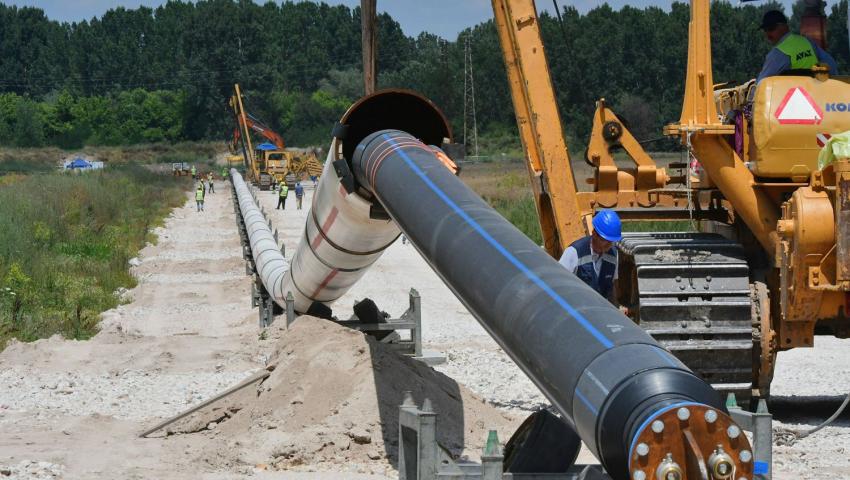The interconnector with Greece successfully crossed the bed of the Maritsa River
The project was presented as a key part of the opportunities for Bulgaria's energy transition to environmental and sustainable solutions during a round table within the Three Seas Initiative

The construction of the gas connection with Greece continues according to the approved deadlines set in the construction contract, as one of the two most complex stages of technical implementation has already been successfully completed - the laying of pipes under the Maritsa River in the Dimitrovgrad region. This became clear during a round table held in Sofia as part of the Bulgarian hosting of the Three Seas initiative under the auspices of President Rumen Radev.
During the event, the Executive Director of the ICGB project company Teodora Georgieva presented the current progress in the implementation of the interconnector with Greece and outlined the important role that IGB can play in Bulgaria's energy transition to environmental and sustainable solutions. "The EU has set high goals for a green economy and a zero carbon footprint, and there will undoubtedly be a transition period during which new solutions in this direction will be introduced gradually and economically. Such a road is ahead for Bulgaria, where natural gas can play a key role as a transitional source of energy. A reasonable and effective solution would be the transition of coal-fired thermal power plants in the country to natural gas, which will allow for synergy with the IGB. Such a transformation will significantly reduce carbon dioxide emissions and optimize the costs of these companies, which will inevitably have a positive effect on energy consumers in the country. This will bring Bulgaria closer to the common goals of the Union and will help us to take the first decisive steps on the path to hydrogen and full decarbonisation. It is extremely important for our country to have a clear and concrete plan for the implementation of the goals and the transition to a green economy, "Georgieva said.
According to her, the implementation of the construction activities for the implementation of IGB is progressing at a good pace and the infrastructure is expected to be ready by the end of 2021. Over 100 km of the pipeline are already fully ready and laid in the trench, leaving less than 25 km welding. The first crossing of the gas pipeline under the Maritsa riverbed near Dimitrovgrad was also successfully completed. "This was one of the biggest technical challenges in the project, especially due to the complex geology under the river bottom. The whole process took 28 days, and the final phase - the pulling of the prepared section, took over 10 hours of continuous work cycle, "said Georgieva. The length of the section is 422 m, and the crossing is done by means of horizontally directed drilling. The quality control is carried out on site by representatives of ICGB, the contractor, the construction company and the project consultant engineer. A number of tests and the preparation of a significant amount of documentation related to quality control are required before the implementation is accepted as successful by the contracting authority. After the successful completion of this stage, the teams will start drilling under the dam "Studen Kladenets", which has an impressive length of 1420 m.
The presentation of the project was one of the main highlights of the energy panel of the business forum, which took place as part of the Three Seas initiative. IGB will connect the Greek gas transmission system of DESFA and TAP near Komotini with the Bulgarian gas transmission system near Stara Zagora. The interconnector is part of the Vertical Gas Corridor - Greece - Bulgaria - Romania - Hungary, providing access to natural gas from the Southern Gas Corridor and LNG to Southeast and Central Europe, as well as Ukraine. The project will contribute to the diversification of sources and increased security of natural gas supply for both Bulgaria and the region. The gas connection with Greece also provides access to the gas transmission network for Bulgarian municipalities and regions that have not yet had an option for connectivity. The project is among the main priorities in the energy sector of the national governments of Greece and Bulgaria and meets strong support from the EC, the EIB and foreign partners such as the United States and Azerbaijan. The interconnector will be put into commercial operation no later than July 1, 2022.
